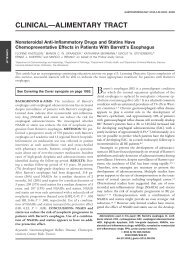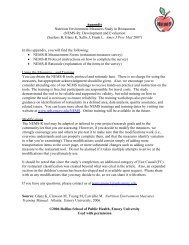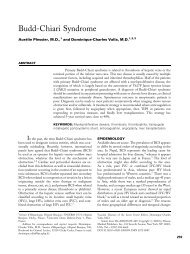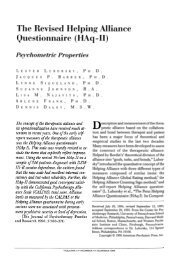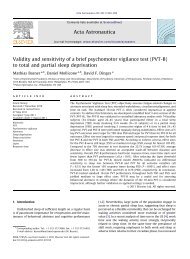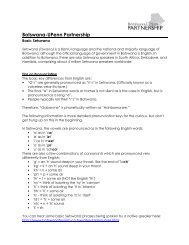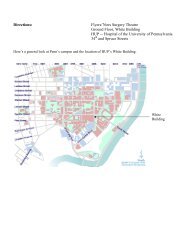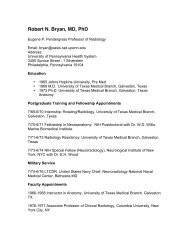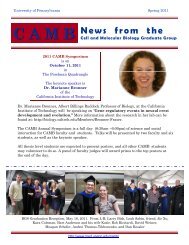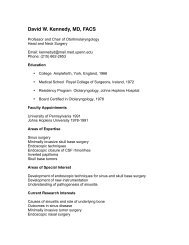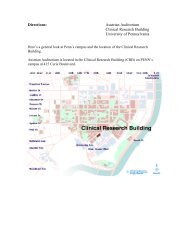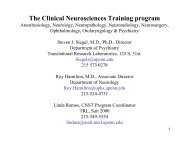PPP_Summer 2010_EDITED FINAL 072010:PPP.qxd - University of ...
PPP_Summer 2010_EDITED FINAL 072010:PPP.qxd - University of ...
PPP_Summer 2010_EDITED FINAL 072010:PPP.qxd - University of ...
Create successful ePaper yourself
Turn your PDF publications into a flip-book with our unique Google optimized e-Paper software.
PAGE 24<br />
Kelly Allison, PhD was interviewed<br />
about night eating on November 17,<br />
2009 for CBS 2 (New York)* and on<br />
December 8, 2009 for CBS 3 (Philadelphia).*<br />
She noted that Penn's Center for<br />
Weight and Eating Disorders is conducting<br />
a study to test whether a drug<br />
can help regulate serotonin levels and<br />
correct Night Eating Syndrome.<br />
A study in the January<br />
6, <strong>2010</strong> Journal <strong>of</strong><br />
the American Medical<br />
Association from a<br />
team <strong>of</strong> mental health<br />
researchers, including<br />
Robert J. DeRubeis, PhD (Psychology)<br />
and Jay D. Amsterdam, MD, found<br />
that patients with severe depression<br />
benefit most from antidepressant medications,<br />
while those with less-severe<br />
symptoms see little or no benefit. Coverage<br />
appeared in more than 35 outlets,<br />
including the Wall Street Journal,<br />
CNN, New York Times, USA Today, LA<br />
Times, Good Morning America,<br />
Reuters, Forbes, Bloomberg, and television<br />
stations across the country. A January<br />
15, <strong>2010</strong> Psychiatric News story*<br />
looked into research on complementary<br />
and alternative medicines for mental<br />
health-related issues, including a study<br />
conducted by Dr. Amsterdam and colleagues<br />
at Penn that appeared in the<br />
August 2009 Journal <strong>of</strong> Clinical Psychopharmacology.<br />
This study found that<br />
chamomile extract may be effective in<br />
reducing the symptoms <strong>of</strong> anxiety.<br />
In a November 8, 2009 Philadelphia<br />
Inquirer article* about a missing local<br />
woman who suffers from bipolar disorder,<br />
Christos Ballas, MD spoke <strong>of</strong> the<br />
possible effects <strong>of</strong> her medications.<br />
The work <strong>of</strong> Aaron T. Beck, MD and<br />
Martin E. P. Seligman, PhD (Psychology)<br />
was referenced in a June 17, <strong>2010</strong><br />
opinion piece in The Australian about<br />
whether Britain's recently released<br />
report on the 1972 Bloody Sunday<br />
shootings in Northern Ireland could<br />
produce reconciliation between the<br />
parties in the conflict.<br />
Steven J. Berkowitz, MD was a guest<br />
on WHYY's (Philadelphia) Voices in<br />
the Family* with Dr. Dan Gottlieb on<br />
February 10, <strong>2010</strong>, discussing the pro-<br />
OUR UR DEPARTMENT EPARTMENT IN THE NEWS EWS<br />
found psychological impact <strong>of</strong> natural<br />
disasters, as it affects not only those<br />
who experienced the disaster, but relief<br />
workers, media pr<strong>of</strong>essionals, and family<br />
members.<br />
In a story* that aired on the CBS<br />
Evening News on April 28, <strong>2010</strong>, Donald<br />
Silberberg, MD (Neurology) and<br />
Wade Berrettini, MD, PhD participated<br />
on an NIH panel looking at research<br />
about tactics to prevent Alzheimer's<br />
disease, such as exercise, cognitive<br />
games, diet and nutritional supplements.<br />
The panel concluded, according<br />
to the CBS report, that “there is no<br />
proven way to prevent or even slow<br />
down the onset <strong>of</strong> Alzheimer’s.”<br />
Gregory K. Brown, PhD was quoted in<br />
a May 3, <strong>2010</strong> Philadelphia Inquirer article*<br />
regarding the risk <strong>of</strong> suicide<br />
among college students.<br />
Anna Rose Childress, PhD was quoted<br />
in an October 6, 2009 article* that<br />
ran in a dozen McClatchy newspapers,<br />
looking at the effects <strong>of</strong> dopamine, a<br />
natural brain chemical that is linked to<br />
pleasure, addiction, and disease.<br />
James C. Coyne, PhD<br />
was quoted in a December<br />
8, 2009 article* in<br />
Psychology Today's "In<br />
the Trenches" blog. The<br />
article disussed how the<br />
field <strong>of</strong> neuropsychology<br />
has advanced our understanding <strong>of</strong><br />
the brain and its neuroplastic ability to<br />
change structurally by interactions,<br />
thoughts, and actions. He was also<br />
quoted in a December 30, 2009 New<br />
York Times article,* titled “Seeking a<br />
Cure for Optimism,” which discussed<br />
the suggested health benefits <strong>of</strong> an<br />
optimistic attitude. The article was also<br />
posted by the AARP Bulletin. Dr.<br />
Coyne was also quoted in a January 2,<br />
<strong>2010</strong> UK Guardian article, titled “Smile<br />
You’ve Got Cancer,” in connection<br />
with a review <strong>of</strong> studies <strong>of</strong> whether<br />
psychotherapy promotes the survival<br />
<strong>of</strong> cancer patients.<br />
In a March 1, <strong>2010</strong> interview* with<br />
WHYY Radio (Philadelphia), Guy S.<br />
Diamond, PhD discussed the important<br />
role communication plays in teen<br />
PENN PSYCHIATRY PERSPECTIVE � SUMMER <strong>2010</strong><br />
[* indicates news story is available on the Web by accessing the "Penn Psychiatry in the News"<br />
section <strong>of</strong> the departmental website – www.med.upenn.edu/psych/news.html]<br />
suicide prevention.<br />
David F. Dinges, PhD was quoted in<br />
an October 19, 2009 article* on<br />
Forbes.com, regarding the role <strong>of</strong> genes<br />
in sleep regulation and duration. He<br />
and lab technician Christopher Jones<br />
were highlighted in an October 24,<br />
2009 Science News article, "Dying to<br />
Sleep," which looked at new data about<br />
sleep's benefits, suggesting that losing<br />
sleep might increase mortality risk and<br />
compromise health. The article, by<br />
Tina Hesman Saey, PhD, won the<br />
Endocrine Society Award for Excellence<br />
in Science and Medical Journalism.<br />
Dr. Dinges was also quoted in a<br />
November 26, 2009 article* in the New<br />
Scientist regarding the relationship<br />
between sleep and memory, and in a<br />
December 28, 2009 Boston Globe article*<br />
examining why some people can function<br />
with little sleep, while others<br />
require eight or more hours. He discussed<br />
sleep debt recovery in a January<br />
14, <strong>2010</strong> article* in USA Today, which<br />
reported research showing that<br />
although chronically sleep-deprived<br />
individuals may seem near-normal<br />
when they awake, their ability to function<br />
deteriorates markedly as night<br />
falls. Dr. Dinges was also featured in a<br />
January <strong>2010</strong> Men's Health article,*<br />
which looked at the impact sleep<br />
deficit has on productivity and health,<br />
and was quoted in an article* on<br />
Oprah.com, discussing mid-afternoon<br />
drowsiness and how best to combat the<br />
sluggishness. His research on the consequences<br />
<strong>of</strong> sleep deprivation was featured<br />
prominently in the February 12,<br />
<strong>2010</strong> issue <strong>of</strong> CQ Researcher and his<br />
work was also highlighted in an April<br />
20, <strong>2010</strong> New Scientist article* looking at<br />
concentration, fatigue, and how long<br />
can we push ourselves mentally before<br />
our brain needs a break.<br />
C. Neill Epperson, MD was interviewed*<br />
on November 16, 2009 by 6<br />
ABC (Philadelphia) reporter and new<br />
mom Erin O'Hearn about some <strong>of</strong> the<br />
challenges associated with the maternal<br />
adjustment during the transition <strong>of</strong><br />
returning to work after childbirth. On<br />
December 22, 2009, she was interviewed<br />
on WHYY (Philadelphia) in a<br />
segment titled “Digest This: Pregnancy<br />
Continued on page 25<br />
www.med.upenn.edu/psych




